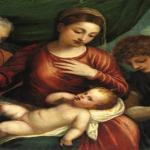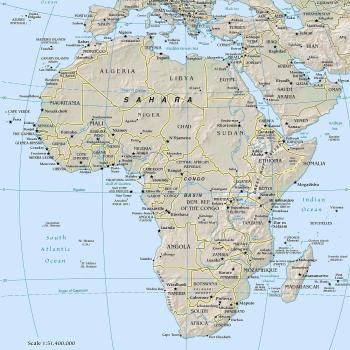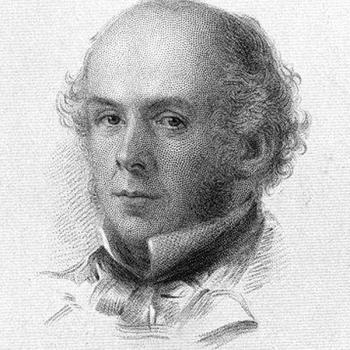Christmas is at once a feast of Creation and Incarnation, as the two stories are so intimately integrated in the Prologue to John’s Gospel. On Christmas Day, then, it seems appropriate to quote one of the great poems about the Creation, but this particular one has a special story attached to it. Not only is this a truly ancient poem, dating back some 1400 years, but it is regarded as one of the first literary works in the English language, and it is by the very first English author whose name we know. Here it is:
Now [we] must honor the guardian of heaven,
the might of the architect, and his purpose,
the work of the father of glory
as he, the eternal lord, established the beginning of wonders;
he first created for the children of men
heaven as a roof, the holy creator
Then the guardian of mankind,
the eternal lord, afterwards appointed the middle earth,
the lands for men, the Lord almighty.
Those opening words – Nū scylun hergan hefaenrīcaes uard – mark the beginning of English Christian culture. In more senses than one, this poem marks a new creation.
But beyond its ancient character, the poem also touches on many other themes that I have explored recently in this blog, especially about how the old Roman province of Britain (Celtic and Christian) became the new Anglo-Saxon England (Germanic and pagan), with its radically different language. The story involves some genuinely surprising exchanges and crossovers.
The story begins with one Caedmon, who probably around the 660s was a humble lay-brother in the monastic house of Whitby in Yorkshire. This was then part of the Anglo-Saxon kingdom of Northumbria. The town is a wonderful tourist destination to this day, though the monastic ruins now play second fiddle to memories of Count Dracula, but that is a digression. Through an angelic vision, Caedmon was encouraged to compose Christian poetry in Anglo-Saxon, of which we have some samples. According to the historian Bede, Caedmon later ranged widely over the Bible:
He sang the creation of the world, the origin of man, and all the history of Genesis, the departure of the children of Israel out of Egypt, their entrance into the promised land, and many other histories from Holy Scripture; the Incarnation, Passion, Resurrection of our Lord, and His Ascension into heaven; the coming of the Holy Ghost, and the teaching of the Apostles; likewise he made many songs concerning the terror of future judgement, the horror of the pains of hell, and the joys of heaven; besides many more about the blessings and the judgements of God.
The story is famous, but what is surprising here is Caedmon’s name, which is not Anglo-Saxon, but Celtic and British. I have discussed this before, but the familiar story of the fall of Roman Britain goes like this. The Anglo-Saxons invaded in the fifth century, the old British Celts were killed, conquered, or expelled – either overseas to Brittany, or else to the northern and western parts of Britain. The remaining Celtic British left virtually no trace on the English that developed in what became England, and that is a stark contrast to what happened in countries like France, Spain or Italy, where the invading Germans ended up speaking languages derived from the Latin of their subject peoples. (Just to reiterate that the British were Celtic and Roman, the English were Germanic – which is why it really annoys modern Brits when anyone refers to King Arthur as a ruler of the “English.” It’s like calling Sam Houston a famous Mexican).
Something different happened in Britain, though historians disagree exactly what that was, and why it occurred. Some think the British themselves adopted Anglo-Saxon because it was the language of their superiors, in a process that some call elite emulation. Others think the British were so despised and inferior that they existed in a kind of Germanic-dominated apartheid state, as existed in white-ruled South Africa, so their language was simply wiped out.
So here we have Caedmon, who appears to be a lower-class person lacking education, and Bede gives no suggestion that he was anything other than a regular Anglo-Saxon by race or language. But look at his name. It is identical with the Celtic name Catamanus, or its later Welsh version Cadfan, and there were some very famous British incumbents of that name around this time.
By far the most significant was one Catamanus who ruled the powerful north Welsh kingdom of Gwynedd from his fortress on the island of Anglesey. Although we know little about his rule or character, we have a grave memorial erected on his death around 625, and it is stunning. It commemorates “Catamanus rex sapientisimus opinatisimus omnium regum” (King Catamanus, wisest and most renowned of all kings). These titles sound like they had come straight from the flowery diplomatic language of the Byzantine empire (after making due allowance for translation from that empire’s Greek). Very likely, the language does reflect links between Celtic Britain and the Empire around that time, as indicated by the presence of Mediterranean pottery and trade objects in British excavations. This is pure speculation, but did the phraseology actually come from the pen of some Byzantine official trying to establish contact with kings on the distant periphery of what had once been the Western Roman Empire? Did that inscription start as the opening of a diplomatic letter? I have written elsewhere about British/Mediterranean ties in precisely this era, when Welsh kings named their sons after the contemporary Byzantine emperor Maurice.
I do make one suggestion. In the later sixth century, the Byzantine Empire had close relations with the Merovingian Frankish dynasty in Gaul, and as allies of the emperor Maurice, the Franks repeatedly invaded Italy to fight the Lombards. But the Franks were becoming too powerful in their own right, and definitely had their own ambitions in Italy and the larger Mediterranean world. As a counterweight, it is quite likely that the Byzantines should have sought allies against the Franks in the closely linked territories of western Britain and Brittany, so a diplomatic venture here too is plausible. This would have been very standard operating procedures for an empire seeking to influence matters far beyond its frontiers. If Byzantine envoys could dabble in the affairs of what we now call France, why not Britain?
Catamanus was succeeded by his son, Cadwallon, who may have been the one who erected that flowery tablet. In the 630s he went on to win an astonishing victory against the mighty English kingdom of Northumbria. Again according to Bede, he was not content just to annex the land, but he fought a genocidal race war, and made a systematic attempt to exterminate its Anglo-Saxon peoples. Cadwallon was finally defeated and killed in 634 at a battle fought near Hadrian’s Wall.
But to get back to Caedmon. The Celtic name must mean that he came from that British ancestry, as it is inconceivable that an Anglo-Saxon family might have chosen the name out of an imaginary Celtic baby book. This was simply not an age when families named their children after contemporary celebrities, and certainly not ones from rival neighboring states. (Don’t tell me about William Tecumseh Sherman).
We might go further and suggest that Caedmon’s family must have fallen dramatically in status. Celtic names beginning with Cata- (war or battle) generally imply aristocratic or royal status, as in the case of kings Catamanus (Battle Horse), or Cadwallon (originally Katuwellaunos or Battle Leader). So why do we find the name Caedmon held by a lowly lay brother and cow herd? Might he or his family have come to Northumbria as a war prisoner or hostage? Or was he from the local Celtic peoples in Yorkshire? We just don’t know.
Also interesting is just when he received his name. What little we know of Caedmon is that he was well on in years before he received his poetic gift. In the context of the time, that could mean (say) forty years, but that would virtually certainly mean that he was born in the time of the famous king Catamanus. Was he even named after him, maybe implying some distant kinship?
Then there is the question of just where he received his Christian knowledge. Bede stresses how utterly uneducated he was, and unfamiliar with any religious or Biblical teaching, but let’s explore that. Bede wants to tell a miracle tale, and that only works if he makes Caedmon a cultural and educational blank slate. In reality, he might not have been. If Caedmon was British, and especially if there was some kind of aristocratic background, even a generation or so before, then his family would certainly have been Christian, and for centuries beforehand. Now, that Christian background need not necessarily have meant much in terms of his actual knowledge or skill. But I just offer the possibility that Caedmon was bringing some half-buried family traditions to bear in his verse. Bede explicitly says that English was his native tongue, but he makes no comment about whether Caedmon spoke any other language, such as British.
By the way, I talk about what Bede thought or believed. In fact, he was wholly guided by what he received from local sources and correspondents, in this case in Whitby, and we can’t be sure how accurately or fully they were recording things.
However we answer these various questions, Caedmon does contribute to that long standing debate about how Britain became England. Here, for certain, we have an apparent British person of Celtic stock and name, who not only speaks Anglo-Saxon as his native tongue, but composes in it, leaving no trace of any Celtic antecedents.
Finally, I offer one other cross-cultural connection from roughly this same time period. In the 680s, the Anglo-Saxon kingdom of Wessex had a tough warrior king named Caedwalla, who would have lived from roughly 659 to 689. His name is exactly the same as that of the (British/Welsh) Cadwallon I mentioned earlier, although Bede does not suggest that the Wessex prince was in any sense “non-English.” This is only one of several weirdly British names that appear in the royal house of that otherwise impeccably Anglo-Saxon state. I honestly doubt that anyone deliberately chose to name an Anglo-Saxon princeling after a British king whose goal in life appears to have been exterminating the Anglo-Saxons. Rather, the name just stemmed from an old British/Welsh aristocratic family which was interbred with the ruling house of Wessex, and possibly the Gwynedd royal line that produced the original Cadwallon. As in Caedmon’s humble case, the British bloodline was flowing in that house.
So yes, British and English, pagans and Christians, were far more intertwined than we might otherwise suspect. It would be oddly appropriate if this one man, who stands at the beginning of “English” culture, should himself had exemplified that process of interbreeding and cultural interaction. Or as Kipling almost wrote, “And so was Britain born.”
Another English-born writer, Denise Levertov wrote a fine poem about Caedmon and the moment of his inspiration.
















